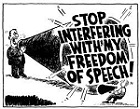Whose freedom? What speech?
April 8th, 2014 | Published in Race(ism)
Freedom for bigots
 The Australian government, and Human Rights Commissioner, Tim Wilson (click here) want to repeal Section 18C of the Racial Discrimination Act (click here) because they say it limits free speech. Attorney-General George Brandis says people “have a right to be bigots” (click here).
The Australian government, and Human Rights Commissioner, Tim Wilson (click here) want to repeal Section 18C of the Racial Discrimination Act (click here) because they say it limits free speech. Attorney-General George Brandis says people “have a right to be bigots” (click here).
This position sits within a conservative right-wing neoliberal agenda in which human rights are reduced to individual rights (click here). The move to repeal Section 18C has an intriguing backstory, partly to do with Andrew Bolt, a News Corp journalist who was found, on 28 September 2011, to have committed an offence under the Act (click here). Andrew Bolt works for Rupert Murdoch and both men have close ties to the Prime Minister (click here).
No freedom for critics
In an interesting twist, ruling politicians also want to stop public servants criticising the government, specifically through social media (restriction on criticism in mainstream media is old news) whether or not it is done anonymously, in their own time, and on their private accounts.
Indeed, so keen the government appears to be to limit the freedom of public  servants, the same freedom seen as unnecessarily constrained by Section 18C, that they have reportedly issued instructions to government employees to dob-in colleagues who transgress relevant guidelines (click here; and here) (Note: these reports seem clear enough to me, although there has also been a suggestion that they might need further validation, so I will update this post if I get better information.)
servants, the same freedom seen as unnecessarily constrained by Section 18C, that they have reportedly issued instructions to government employees to dob-in colleagues who transgress relevant guidelines (click here; and here) (Note: these reports seem clear enough to me, although there has also been a suggestion that they might need further validation, so I will update this post if I get better information.)
Whose freedom? What speech?
To point out the obvious, there’s a contradiction here; one that favors the interests of the relatively powerful (politicians) over employees (public servants) and racial minorities, particularly Aboriginal and Torres Strait Islander Peoples who have a long history of dispossession, discrimination, and disadvantage in their own country; an ongoing situation, as John Pilger points out (click here).
Such anomalies are predictable, Waleed Aly notes (click here), “when law-makers proceed as though ours is a society without a power hierarchy simply because they sit at the top of it.”
The social justice agenda
Coming from the opposite direction – with an aim of subverting (rather than perpetuating) existing power structures – I favor retaining Section 18C, but encouraging (constructive) criticism of governments and other powerbrokers. (In case it needs to be stated, I believe criticism should be about policies and practices, not personalities.)
I don’t have a problem with my contradiction because it tips the balance of power a little in the direction of relatively less powerful groups – in this case, employees and racial minorities. “Governments of both hues have been protecting the powerful at the expense of the powerless for years,” as Michael West says (click here) and it is time for a turnaround.
 The social justice agenda, as I see it, involves redistribution of sociopolitical power from the top down, and the bottom up, so that we approach a situation of social equity. Until we have such a situation, we need provisions such as Section 18C, and we definitely need to keep the critical edge well occupied and highly vocal.
The social justice agenda, as I see it, involves redistribution of sociopolitical power from the top down, and the bottom up, so that we approach a situation of social equity. Until we have such a situation, we need provisions such as Section 18C, and we definitely need to keep the critical edge well occupied and highly vocal.
Your comments are welcome…Joan Beckwith.



andrew bolt is a man of great integrity and honesty and all media correspondences should be conducted by this man in relation to to the current topics on immigration, religion, native title rights and to the current situation regarding george pell. his ability to find evidence, proof that is not bias is of the highest order. he is a man who believes in the truth and that justice prevails in any topic he reports on. i think he can see as well as many others that the political agenda by this current government is not in the best interests of the people. i admire him so much for making a stand for what he believes in.
Interesting that this comment has arrived two years after the post was published. You are welcome to express your views, Anonymous. In reply, I would agree to disagree, and suggest that “bias” (like other concepts) is in the eye of the beholder…Joan Beckwith.
Government put on notice on this one? Nine out of 10 voters surveyed do NOT support changes to Section 18C:
http://m.theage.com.au/federal-politics/political-news/race-hate-voters-tell-brandis-to-back-off-20140413-zqubv.html
HUMAN RIGHTS LAW CENTRE is providing information on giving feedback to government about changes to Section 18C.
Submissions to government are due 30 April 2014.
Hugh de Kretser, CEO of HRLC says: “We encourage interested individuals and organisations to let the Government know their views. IT’S PARTICULARLY IMPORTANT THAT THE GOVERNMENT HEARS FROM COMMUNITIES WHO BEAR THE BRUNT OF RACISM.”
http://hrlc.org.au/racial-vilification-laws-new-resources-to-help-the-public-give-feedback-on-changes/
Joan Beckwith.
Articles related to this intersection between freedom of speech, Section 18C of the Racial Discrimination Act, and the silencing of public servants have just kept appearing, and here are links to some of them.
Indigenous leaders want Racial Discrimination Act strengthened, not weakened (Sarah Whyte, The Age, 9 April 2014)
http://www.theage.com.au/federal-politics/political-news/indigenous-leaders-ask-attorneygeneral-to-protect-their-people-in-race-law-debate-20140408-36bb6.html
Government’s approach inconsistent (Professor Sarah Joseph, director of Castan Centre for Human Rights Law, The Age, 9 April 2014, p.18)
http://www.theage.com.au/comment/freedom-the-governments-inconsistent-approach-20140408-zqs32.html
Free speech, but only for Abbott elite (Jenna Price, The Age, 7 April 2014)
http://www.theage.com.au/comment/free-speech-but-only-for-abbott-elite-20140407-zqrqv.html
More on the new HR policy for public servants (Greg Jericho, The Drum, 9 April 2014)
http://www.abc.net.au/news/2014-04-09/jericho-nothing-to-like-about-social-media-gag/5375322
Public servant who criticised the government on Twitter (Markus Mannheim, SMH, 13 Aug 2013)
http://www.smh.com.au/national/public-servant-loses-fight-over-twitter-attack-on-government-20130812-2rsgn.html
Public service’s leaked guide to dobbing on colleagues is now ‘secret’
Markus Mannheim, The Canberra Times (8 April, 2014)
http://www.canberratimes.com.au/national/public-service/public-services-leaked-guide-to-dobbing-on-colleagues-is-now-secret-20140408-36aii.html
Social Media Policy of the Department of the Prime Minister and Cabinet
The Canberra Times (8 April, 2014)
http://www.canberratimes.com.au/national/public-service/social-media-policy-of-the-department-of-the-prime-minister-and-cabinet-20140408-36ake.html#ixzz2yQOY4hy2
Compromise suggested on changes to Racial Discrimination Act
The Abbott government should make the protections against hate speech meaningful, says Human Rights Commission chief
http://www.theguardian.com/world/2014/apr/09/compromise-plan-racial-discrimination-act?CMP=ema_792
Facebook feud fires alarm over public service snoop plans
Noel Towell and May McNeilage, The Age (11 April, 2014, p.3)
http://www.theage.com.au/federal-politics/political-news/facebook-feud-fires-alarm-over-public-service-snoop-plans-20140410-36g42.html
Who’s afraid of anti-discrimination laws?
Rachel Ball, The Drum (11 April, 2014)
http://www.abc.net.au/news/2014-04-11/ball-whos-afraid-of-anti-discrimination-laws/5381798
……………………………………..
PERSPECTIVES ON THE 2011 RULING – ANDREW BOLT CASE
A range of views on the case that led to proposed changes to the Racial Discrimination Act
Posted by ANTaR (11/4/14)
_________________________________
You can read the judge’s findings here:
http://www.austlii.edu.au/au/cases/cth/FCA/2011/1103.html
See also our page ‘Proposed changes to the Racial Discrimination Act’
https://www.facebook.com/notes/antar-victoria/proposed-changes-to-the-racial-discrimination-act/10152390011076214
_________________________________
“Andrew Bolt, Free Speech, and Racial Intolerance”
Sarah Joseph, Castan Centre for Human Rights Law
http://castancentre.com/2011/09/29/andrew-bolt-free-speech-and-racial-intolerance/
“In black and white, Andrew Bolt trifled with the facts”
David Marr
September 29, 2011
http://www.smh.com.au/federal-politics/political-opinion/in-black-and-white-andrew-bolt-trifled-with-the-facts-20110928-1kxba.html
“Bolt, Bromberg and a profoundly disturbing judgment”
Jonathan Holmes
30 Sep 2011
http://www.abc.net.au/news/2011-09-29/holmes-bolt-bromberg-and-a-profoundly-disturbing-judgment/3038156
Andrew Bolt’s response to the court ruling:
see blog entries from 29 September 2011
http://blogs.news.com.au/heraldsun/andrewbolt/index.php/heraldsun/2011/09/
“One Year On: How To Twist And Shout Down A Legal Judgment”
Alan Austin
September 28, 2012
http://www.theglobalmail.org/feature/one-year-on-how-to-twist-and-shout-down-a-legal-judgment/402/Andrew
I tend to agree that it’s the less poweful not the more powerful who ought to be protected. I think a line also needs to be drawn between a person acting as an employee (where loyalty is needed) and a person in their private life and possibly under a pseudonym. I dont think anyone deserves unreserved freedom of speech but as you say “constructive” criticism of the government is surely a democratic right AND duty.
Thanks for your comments, Stef. The distinction you make between a person acting as an employee versus a private individual is one I am sure many would acknowledge. Two things though:
Firstly, the guidelines currently being talked about seem to include private accounts. I’m going to paste in an article I’ve just come across from “The Age” by Jenna Price in which she states:
“It’s not just the professional social media accounts which need to tug the forelock but private ones as well. If public servants are found to have breached the code of conduct, they could find themselves without a job.”
The second thing I would want to argue is that loyalty to employers needs to be a two-way track, and I am not seeing a whole lot of reason for loyalty to this government, although I acknowledge I am viewing it through a particular (social justice) lens.
Enough for now, and here’s the link to Jenna Price’s article…Joan Beckwith
http://www.theage.com.au/comment/free-speech-but-only-for-abbott-elite-20140407-zqrqv.html